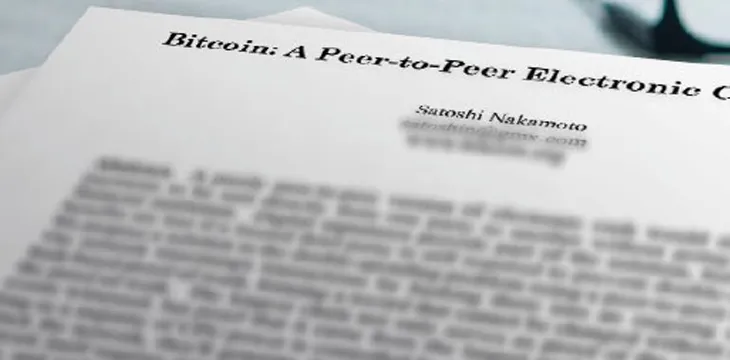|
Getting your Trinity Audio player ready...
|
https://www.youtube.com/watch?v=CICrXHYEXGU
“Theory of Bitcoin,” the in-depth educational series featuring conversations between computer scientist Dr. Craig S. Wright and Money Button founder Ryan X. Charles, is taking a sidestep from its regular programming. Fans need not worry though, as the “Bitcoin White Paper” track is quite similar to what they’d normally expect from the two.
In this special series, Charles and Wright dissect the 2008 Bitcoin white paper line by line, explaining and clarifying what it means. Of special interest are the phrases and points people have misconstrued over the years—deliberately or simply through a lack of deep understanding of networks and economic incentives—that have led them down some interesting, expensive, and even destructive paths.
https://twitter.com/theoryofbitcoin/status/1318322345400889345?s=20
The Electronic Cash System
The Bitcoin White Paper, titled “Bitcoin: a Peer-to-Peer Electronic Cash System,” was released under the name Satoshi Nakamoto in October 2008. It has a number of stand-out attributes. Firstly, it’s only nine pages long, which is quite short for a technical white paper. Secondly, it mentions “honest” 15 times—the relevance of which would only become clear years later. Thirdly, it does not ever mention the word “blockchain,” something that has become a tech industry buzzword since and is an example of how people often find their own meanings in others’ work.
This first episode barely gets past the white paper’s title and Abstract (an indication of just how in-depth the series is).
First, there’s “cash.” Bitcoin, Dr. Wright says, is basically a better form of cash. That doesn’t mean something designed to replace money as we know/use it today, or banks. We may use electronic cash today but its nature and rules of ownership are complicated. Today’s electronic cash, like a bank account balance, is a debt to you owned by the bank. Physical cash itself is a nominal thing you can hold, but using it in a transaction is final (more so than the electronic form).
There need not be any “fiduciaries” in Bitcoin, Dr. Wright says. No-one needs to “hold” your money for you, it can be electronic and also yours in the finalized sense. It also has some properties that make gold valuable, but is far superior. There’s a very interesting tangent about auditing gold reserves, how difficult it is, and the very-profitable ways people have learned to game that system as well.
Peers and Nodes
The opening Abstract of the Bitcoin white paper goes thus:
A purely peer-to-peer version of electronic cash would allow online payments to be sent directly from one party to another without going through a financial institution. Digital signatures provide part of the solution, but the main benefits are lost if a trusted third party is still required to prevent double-spending. We propose a solution to the double-spending problem using a peer-to-peer network.
“Without going through a financial institution” is one particular phrase used by many Bitcoiners to suggest Bitcoin is anti-bank. But as Dr. Wright explains, banks do (and will for a long time) serve many useful purposes in the economy.
Much of the conversation covers just what the definition of “peer-to-peer” is. Though most think of it as direct message-passing between individual users, Dr. Wright explains how this is not necessarily the case—or desirable. Though early iterations of the Bitcoin protocol allowed IP to IP transactions, this proved unwieldy and Wright explains how today it more properly describes communications between “nodes.” A node, as he has explained at length previously, describes a Bitcoin network peer that actually creates blocks.
These nodes may become large, and this was anticipated. Charles notes the white paper says “the network itself has minimal structure,” and Dr. Wright describes how, like the Internet, large nodes connect to other large nodes because that’s all they need, and individual users pass through those hubs, becoming a network of networks. But the block-producing nodes are the true “peers” on the Bitcoin network. These nodes have various economic incentives set in the protocol to act honestly and maintain the network’s integrity, a topic that has been discussed at length in other “Theory of Bitcoin” episodes.
There’s also some interesting discussion of how human law views principles of ownership and identity, particularly with regard to signatures. A signature is worthless without identity, Wright explains, whether full or pseudonymous. A Bitcoin “key” is not a signature in the legal sense; more of a code you use to access your property.
The theme of human law often pervades these discussions. The crypto-anarchist type of Bitcoiner often touts Bitcoin as something that can surpass human law, whereas Dr. Wright argues that this is impossible, and that humans must retain their primacy over machines and code (which have no agency of their own).
A “trusted third party” may be one where, if its security is compromised, compromises the whole system—often reaching into its distant history. This does not happen with Bitcoin, though it can (and does) happen with electronic payment processors, certificate signers (eg: DigiNotar) and large corporations (like Microsoft).
Though the “Bitcoin white paper” is a kind of tangent from the rest of the “Theory of Bitcoin” series, it’s very much an integral part of it. Viewers will notice many similar topics and angles covered, but there are always plenty of new ones. The entire series, which Charles hopes eventually to turn into a formal course of study, is essential background knowledge not only to knowing about Bitcoin, but understanding it. They’ll also come to learn that understanding the principles behind Bitcoin is just as important as knowing its technological structure.
To watch previous episodes of the Theory of Bitcoin, subscribe to the Theory of Bitcoin YouTube channel here.

 09-15-2025
09-15-2025 





